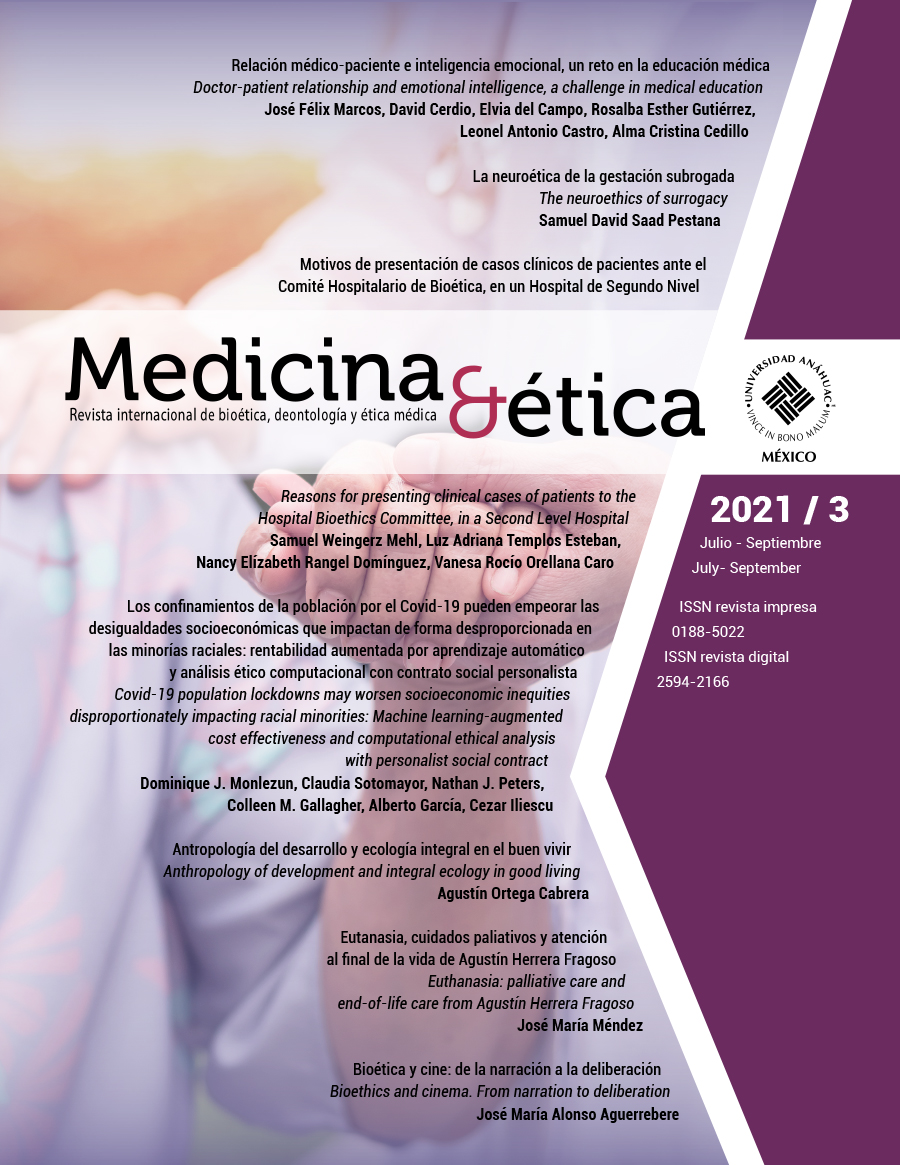The The neuroethics of surrogacy
Main Article Content
Abstract
Concerns over the commodification of life posed by commercial gestational surrogacy often overshadow the discussion on the forms of surrogacy that are not commercial. Moreover, discoveries of the neurosciences and empirical evidence on the possible psychological damage on the mother-child binomial are seldom considered when discussing the permissibility of surrogacy. In this pilot study I made a review on the available literature about the impact of perinatal neurophysiology on maternal-child bonding and empirical psychological evidence, inquiring whether surrogacy could be proven to damage the binomial, rendering it unethical from a personalist neuroethics approach. Recent studies on the neural and hormonal pathways leading to maternal bonding do suggest an association between it and maternal psychological well-being overall. However, empirical translational evidence on the clinical implications of surrogacy arrangements on both the gestational carriers and the children was limited and inconclusive. Further studies are necessary to make a conclusion regarding this subject.
Downloads
PLUMX Metrics
Article Details

This work is licensed under a Creative Commons Attribution-NonCommercial-ShareAlike 4.0 International License.
Medicina y Ética is distributed under a Creative Commons License Atribución-NoComercial-CompartirIgual 4.0 Internacional.
The author keeps the property rights with no restriction whatsoever and guarantees the magazine the right to be the first publication of the work. The author is free to deposit the published version in any other medium, such as an institutional archive or on his own website.
References
2. The Supreme Court of New Jersey. Matter of baby M. New Jersey; 1988. (Con- sultado el 11 de noviembre de 2020). Disponible en: https://law.justia.com/cases/ new-jersey/supreme-court/1988/109-n-j-396-1.html
3. Oakley J. Altruistic surrogacy and informed consent. Bioethics. Octubre de 1992; 6(4): 269-287. https://doi.org/10.1111/j.1467-8519.1992.tb00206.x
4. Gunnarsson J. Autonomy in altruistic surrogacy, conflicting kinship grammars and intentional multilineal kinship. Reproductive BioMedicine and Society Online. 2018; 7: 66-75. https://doi.org/10.1016/j.rbms.2018.10.014
5. Tieu MM. Altruistic surrogacy: The necessary objectification of surrogate mo- thers. J Med Ethics. 2009; 35: 171-175. https://doi.org/10.1136/jme.2008.024679 6. Al-Adib M. Gestación subrogada desde una perspectiva biomédica: lo que el debate científico puede añadir a la discusión ética. Revista Internacional de Éticas Aplicadas. 2018; 10(28): 13-19.
7. Schurr C, Militz E. The affective economy of transnational surrogacy. Environ- ment and planning A. Economy and Space. 2018; 50(8): 1626-1645. https://doi.org/10.1177/0308518X18769652
8. Schurr C. From biopolitics to bioeconomies: The art of (re-)producing white futures in Mexico’s surrogacy market. Environment and Planning D. Society and Space. 2017; 35(2): 241-262. https://doi.org/10.1177/0263775816638851
9. Anleu SR. Surrogacy: For love but not for money? Gender & Society. 1992; 6(1): 30-48. https://doi.org/10.1177/089124392006001003
10. Eapen V, Dadds M, Barnett B, Kohlhoff J, Khan F, et al. Separation anxiety, attachment and inter-personal representations: Disentangling the role of oxytocin in the perinatal period. PLOS ONE. 2014; 9(9): e107745. https://doi.org/10.1371/journal.pone.0107745
11. Augustine RA, Seymour AJ, Campbell RE, Grattan DR, Brown CH. Integrative neurohumoural regulation of oxytocin neurone activity in pregnancy and lactation. Journal of Neuroendocrinology. 2018; 30: e12569. https://doi.org/10.1111/jne.12569.
12. Numan M, Young LJ. Neural mechanisms of mother-infant bonding and pair bonding: Similarities, differences, and broader implications. Horm Behav. 2016; 77: 98-112. https://doi.org/10.1016/j.yhbeh.2015.05.015
13. Olazábal DE. Role of oxytocin in parental behaviour. Journal of Neuroendocri- nology. 2018; 30: e12594. https://doi.org/10.1111/jne.12594
14. Thul TA, Corwin EJ, Carlson NS, Brennan PA, Young LJ. Oxytocin and post- partum depression: A systematic review. Psychoneuroendocrinology, 2020. https://doi.org/10.1016/j.psyneuen.2020.104793
15. Hoekzema E, Barba-Müller E, Pozzobon C, Picado M, Lucco F, García D, et al. Pregnancy leads to long-lasting changes in human brain structure. Nature Neu- roscience. 2016; 20(2): 287-300. https://doi.org/10.1038/nn.4458
16. Stolzenberg DS, Champagne FA. Hormonal and non-hormonal bases of ma- ternal behavior: The role of experience and epigenetic mechanisms. Horm Behav, 2015. https://doi.org/10.1016/j.yhbeh.2015.07.005
17. Loike JD, Fischbach RL. New Ethical Horizons in Gestational Surrogacy. J IVF Reprod Med Genet. 2013; 1(2): 1-4. https://doi.org/10.4172/2375-4508.1000109 18. Lamba N, Jadva V, Kadam K, Golombok S. The psychological well-being and prenatal bonding of gestational surrogates. Human Reproduction. 2018; 33(4): 646-653. https://doi.org/10.1093/humrep/dey048
19. Imrie S, Jadva V. The long-term experiences of surrogates: Relationships and contact with surrogacy families in genetic and gestational surrogacy arrange- ments. Reproductive BioMedicine Online. 2014; 29: 424-435. https://doi.org/10.1016/j.rbmo.2014.06.004
20. Golombok S, Blake L, Casey P, Roman G, Jadva V. Children born through re- productive donation: A longitudinal study of psychological adjustment. J Child Psy- chol Psychiatry. 2013; 54(6): 653-660. https://doi.org/10.1111/jcpp.12015
21. Söderström-Anttila V, Wennerholm UB, Loft A, Pinborg A, Aittomäki K, Ro- mundstad LB, Bergh C. Surrogacy: Outcomes for surrogate mothers, children and the resulting families, a systematic review. Human Reproduction Update. 2016; 22(2): 260-276. https://doi.org/10.1093/humupd/dmv046
22. Simopoulou M, Sfakianoudis K, Tsioulou P, Rapani A, Anifandis G, Pantou A, et al. Risks in surrogacy considering the embryo: From the preimplantation to the gestational and neonatal period. BioMed Research International. 2018. https://doi.org/10.1155/2018/6287507
23. Woo I, Hindoyan R, Landay M, Ho J, Ingles SA, McGinnis LK, et al. Perinatal outcomes after natural conception versus in vitro fertilization (IVF) in gestational surrogates: A model to evaluate IVF treatment versus maternal effects. Fertility and Sterility. 2017; 108(6): 993-998. https://doi.org/10.1016/j.fertnstert.2017.09.014
24. Giglio F. Bioethical perspective of ontologically-based personalism. Bioethics Update. 2016. https://doi.org/10.1016/j.bioet.2017.01.001
25. Illes J, Bird SJ. Neuroethics: A modern context for ethics in neuroscience. Trends Neurosci. Septiembre de 2006; 29(9): 511-517. https://doi.org/10.1016/j.tins.2006.07.002
26. Sgreccia E. Manual de bioética. 1a ed. México: Diana; 1996.

